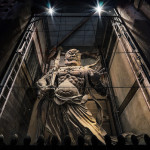We run our website the way we wished the whole internet worked: we provide high quality original content with no ads. We are funded solely by your direct support. Please consider supporting this project.

The Longing of Advent
The Advent season is a time of anticipating the coming of God, in Christ, a time of turning our imagination toward the revelation of God’s love for us. This after all is the deepest longing of our heart, and our natural longings always point us to something real.
We grow hungry only because there’s such a thing as food. We get thirsty only because there’s such a thing as water. We have sex drives only because there’s such a thing as sex. Human drives and desires seem to point to realities that fulfill them. If we can get philosophical for a moment, we might say that intuitive longings have ontological implications. They tell us something about the real world.
We naturally long for and hope for love that is beyond what we experience in our mundane lives, for something beyond us. During the season of Advent, we remember this longing and put our hope in the fact that God has come in Christ.
If our Creator is in fact like this—a God who came to us as a baby and then died a hellish death out of love for those who were killing him—then we can begin to understand why we are like we are. Our hope-filled dreams of love outrun anything we find in the world, and now we can understand why. We dream beyond the world because we are made for someone beyond this world. We are created by God and for God, and as Augustine said, our hearts cannot rest until they rest in God. We are created to love and be loved by a God who is, from eternity to eternity, perfect, unsurpassable, incomprehensible, infinite love.
Paul and the Gospels proclaim that, out of his unfathomable love, the God whom we restlessly long for has come into our world. In Jesus, God entered our domain to fulfill our dreams. He has come to unambiguously reveal who he is and what he is like. Against everything we’ve imagined “God” or “the gods” to be, Jesus shows us that our Creator is a God who is willing to be crucified to redeem sinners.
He has also come to reveal to us who we are. We are rebels who are nevertheless loved by our Creator with an unconditional love. And he has come to set us free from the power of evil that enslaved us and ultimately to restore the entire creation to what he always wanted it to be. He has come ultimately to extinguish the kingdom of darkness and establish the kingdom of God, in which his perfect love, joy and peace shall someday reign without opposition.
In our heart of hearts, we want to believe the story of Jesus is true, and we have compelling grounds to believe that this story is, in fact, grounded in actual history (see Lord or Legend). Of course, accepting that this story is rooted in history and placing your trust in Jesus requires faith, for it is impossible to prove any historical claim with absolute certainty. However, rejecting the story and basing your life on the assumption that the story is only a myth or a legend also takes faith, for it is equally impossible to prove this claim. I submit that the first act of faith is much more reasonable than the second act of faith.
However we live, we live by faith. The deepest longings of our hearts point us to the reality we find in the story of Jesus. Let’s reflect on this together during this Advent season.
—Adapted from Lord or Legend, pages 153-154.
Photo via bykst via VisualHunt.com
Related Reading

God is Not a Monster
Pastor Brian Zhand has a way with words that captures the imagination. And he is a pastor that has taken time to read the church fathers. In a recent post, he quotes Saint Antony who wrote, “I no longer fear God, but I love him. For love casts out fear.” Brian confronts the common misconceptions and images of God that…

Defining Love
If God’s eternal essence is love, as discussed in this post, then we must ask: What does this confession actually mean? We must explore this question carefully because “love” has been defined in many theological streams in ways that seem contradictory to the kind of love revealed by Christ. As with so many other things,…

Living Into the Future
Why didn’t God create a “perfect world”? Here’s Greg’s response to that question. See more at The Work of the People.

How to Interpret the Law of the Old Testament
While there are multitudes of passages in the OT that reflect an awareness that people are too sinful to be rightly related to God on the basis of the law, there is a strand that runs throughout the OT that depicts Yahweh as “law-oriented.” This label is warranted, I believe, in light of the fact…

Creating God in Our Own Image
How have we created God in our own image? In this short video produced by The Work of the People, Greg reflects on various ways that humans typically think about God in terms of power, and how Jesus reframes the nature of power. The Christian revelation of God is the opposite of what we most often imagine…

The Phinehas vs. Jesus Conundrum
I’ll be frank. This is not a blog that will be easy for some people to read. But it’s a blog I believe every follower of Jesus should read – even if you have to force yourself to press on. It’s about something we all wish was not true. It’s about the way the Bible…
